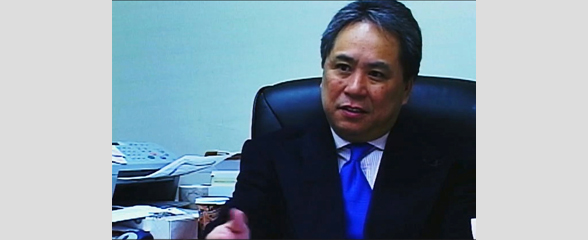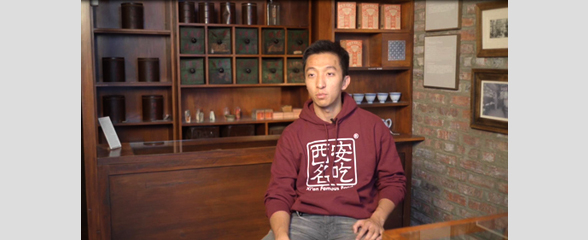Chinese American business enterprises

2014.036.013 Oral History Interview with Tony Wong April 1, 2004
Tony Wong, General Manager at Sino Television, was born and raised in Hong Kong. He immigrated to the United States to study broadcasting at both the undergraduate and graduate level. Tony recalls his initial struggles as a student coming from a poor economic background and how he eventually moved to New York City, receiving a job offer at NBC right after graduation. During his time at NBC and in Sino TV as a part-timer, Tony would learn a myriad of skills including production, directing, and programming. Tony would eventually move on to work at different companies before returning to Sino TV as a full-time employee. He would describe Sino TV’s area of operation, and programming variety, and emphasize their stance on being politically and culturally neutral regarding the different Chinese communities and political views. Later in the interview, Tony shares his thoughts on Chinese unity and stereotypical “passiveness†and observes a change in this following the 9/11 attacks. Tony notes that following the 9/11 attack, the Chinese community banded together to help local recovery and rescue operations and fundraised 1.5 million dollars for the World Trade Center Fund and the American Red Cross. He also highlights other efforts to create programs that promoted Chinese activism for not only disasters but also for political purposes.

2014.036.016 Oral History Interview with Wing Ma November 7, 2003
Wing Ma (Ma Wing Guo) was born in China to a poor farming family who moved to Hong Kong as refugees when he was age two. Wing talks about his life growing up in Hong Kong with his mother working in the garment industry and his father working as a chef in Manila. He studied until post-secondary school before moving to the United States to train and work as an engineer. Wing would eventually join the garment industry as a factory owner, and describes the industry decline over time due to overseas competition. This would also lead to his own factory closure. He details workers pay, union benefits such as healthcare, and his involvement with union negotiations as a member and president of the Garment Manufacturers Association. Wing also talks about his involvement with other community organizations following his transition into the liquor industry, such as the Asian American Advisory Council under Peter Vallone and Community Board Three. He shares his experiences acting as a liaison between the government and the local community and shares some of the positive changes this brought to Chinatown. During the September 11th, 2001 attacks, he recalls being shocked and upset that he was unable to reach friends and loved ones. He talks about the effects of the attacks on Chinatown through his personal experiences as a building landlord. He recalls the mass exodus of tenants from the area and the difficulty in obtaining support from relief funds for the Chinatown community. He discusses the need for the government to subsidize and support businesses returning to the area to improve the local economy. He also encourages the Chinatown community to become more active and participate in local government or social work. He concludes with a discussion of his thoughts on the future of the garment industry and alternative job prospects for Chinatown residents.

2014.036.016 Oral History Interview with Wing Ma November 7, 2003
Wing Ma (Ma Wing Guo) was born in China to a poor farming family who moved to Hong Kong as refugees when he was age two. Wing talks about his life growing up in Hong Kong with his mother working in the garment industry and his father working as a chef in Manila. He studied until post-secondary school before moving to the United States to train and work as an engineer. Wing would eventually join the garment industry as a factory owner, and describes the industry decline over time due to overseas competition. This would also lead to his own factory closure. He details workers pay, union benefits such as healthcare, and his involvement with union negotiations as a member and president of the Garment Manufacturers Association. Wing also talks about his involvement with other community organizations following his transition into the liquor industry, such as the Asian American Advisory Council under Peter Vallone and Community Board Three. He shares his experiences acting as a liaison between the government and the local community and shares some of the positive changes this brought to Chinatown. During the September 11th, 2001 attacks, he recalls being shocked and upset that he was unable to reach friends and loved ones. He talks about the effects of the attacks on Chinatown through his personal experiences as a building landlord. He recalls the mass exodus of tenants from the area and the difficulty in obtaining support from relief funds for the Chinatown community. He discusses the need for the government to subsidize and support businesses returning to the area to improve the local economy. He also encourages the Chinatown community to become more active and participate in local government or social work. He concludes with a discussion of his thoughts on the future of the garment industry and alternative job prospects for Chinatown residents.

2016.037.007 Oral History Interview with Philip Chiang 2015/12/15
Philip Chiang was born in Shanghai, China in 1948. Within a year, his family moved to Tokyo, Japan to avoid Chinas communist regime. He lived in Japan until the age of 14. He valued Japanese culture and the emphasis on hospitality. In 1962, he moved to San Francisco. His family lived there before it became the known, multicultural city it is today. His family ate out frequently, and it gave him the opportunity to enjoy many different cuisines. He grew especially fond of Italian food. Cecilia Chiang, his mother, opened a Chinese restaurant called the Mandarin Restaurant. The Mandarin became known in San Francisco as a high-end Chinese restaurant; it served the stars of Hollywood. Though Chinese cuisine was not new in San Francisco, the Mandarin popularized a refined northern Chinese cuisine. Philip Chiang helped at the family restaurant but did not get interested in the business until he was married. He worked in design and wanted to make more money. Thus, in 1984, he opened the Mandarette. Compared to the Mandarin, Chiangs alternative was cheaper. His clientele was younger and more progressive; it suited the urban and artistic landscape. At the Mandarette, he met Paul Fleming. Fleming continued to support the Chiang familys businesses even when the Mandarette closed. Fleming asked Chiang to help him open a Chinese restaurant in Arizona. In 1982, the now chain restaurant, P.F. Changs, opened its first location in Scottsdale, Arizona. Throughout the years, Chiang maintains one value: food should be simple. He emphasizes recipes that have no more than three ingredients.

2016.037.019 Oral History Interview with Wilson Tang 2015/10/30
Wilson Tang is a second-generation Chinese American restaurateur who was born in 1978 and grew up in Queens, New York. Before Tang was born, his parents decided to move out of Manhattans Chinatown to Queens to have a better family environment. Tang later found his way back to Chinatown when he attended college at nearby Pace University. After college, he went into a finance career, a path his parents strongly encouraged him to pursue. Tang quickly realized that the rat race of the traditional 9-5 job did not hold much appeal for him, and he began to consider entering the restaurant industry as his parents had done when they first immigrated during the early 1970s. Tangs first venture was a bakery opened in a building his father owned on Allen street. The bakery successfully ran from 2004 to 2007; however, success came at a steep price for Tangs personal health and well-being. Tang returned to the finance world in 2007 in order to regain control of his lifestyle and life-work balance. It was during this break from the restaurant world that Tang met his future wife and got engaged. In 2011 the opportunity to take over his uncle’s dim sum restaurant Nam Wah arose. More convinced than ever that the career of restauranteering was his true calling and despite the stress of his previous experience, Tang and his fiance decided to make the leap. The couple did some light renovations and refreshed the menu before opening, attempting to breathe new life into Nam Wah while preserving its historic atmosphere. As Nom Wah was renovated, Tang decided to create a Facebook page to document the long history of the tea parlor. The business received positive coverage from both the Daily News and the New York Times. As a result of this media coverage, business flourished and Nom Wah became a staple of Chinatown. Tang is grateful for the success he has experienced, but notes that the restaurant industry is still an incredibly demanding field. He hopes to use his success as a platform to elevate and support other Chinese American entrepreneurs and Chinatown businesses in NYC.

2016.037.024 Oral History Interview with Jason Wang 2015/10/23
Jason Wang was born in XiAn, China and moved to the U.S. when he was eight years old. Wang and his family lived in various suburban communities during his childhood while his father worked at different Chinese restaurants. Wang’s father eventually opened a bubble tea franchise that later evolved into their successful XiAn Famous Foods restaurant. After spending college breaks helping his father at the bubble tea shop and feeling ungratified by his post-graduation corporate job, Wang decided to begin his career as a restauranteur with his father. Wang helped his father update XiAn Famous Foods by translating its menu into English and creating a website for the business. The original Flushing, Queens location developed a solid fanbase and saw even greater success after Anthony Bourdain mentioned the eatery on his hit television show No Reservations in 2008. Since then, XiAn Famous Foods has expanded to over ten locations across New York City five boroughs. Wang is proud to have pioneered the previously unknown street cuisine of his hometown in America. He hopes that their “fast-casual†restaurant model will enable them to expand to other regions in the U.S. and introduce an increasingly adventurous American public to Xian classics like their iconic liang pi “cold-skin noodles.â€